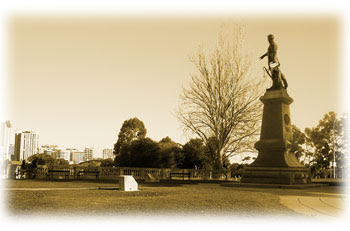
Colonel Light’s original plan for the 100 of Adelaide and its belt of parklands became the fundamental benchmark in Adelaide's planning in the post-war years. Work on the plan began in the late 1950’s. By 1959 interim recommendations were being considered and the final printed plan and illustrated report were submitted to State Parliament in 1962.

Adelaide in the late 1950s had a population of just over half a million. There was little urban development north of Gepps Cross, but the first houses were being built at Elizabeth. Tea Tree Gully was still rural and development did not extend south beyond Darlington. Migrants were flooding in. The population was increasing at 18-20,000 a year and metropolitan Adelaide had become the third largest and fastest growing city in Australia.
University students, women’s organisations and others became involved in basic surveys for the Plan and a small enthusiastic staff was engaged. It was thought feasible to plan for 20 to 30 years ahead to assist public utility and transport authorities. Forecasting future population is a hazardous task, but it was estimated that a million was likely by 1981 and many more by 1991.
A sudden downturn in the rate of population growth in 1970s resulted in the million figure not being passed until the turn of the century.

The hills limit Adelaide’s expansion to the east and the sea to the west, forcing expansion north and south. The most suitable land for urban development to the north lies on the plains nearer to the hills. Elizabeth had been planned with a town centre similar to the British new towns being built at that time and this form of development was thought to be adaptable for Adelaide’s expansion.
If you are looking for a well performing residential or commercial investment property, an addition to your existing property portfolio or a home to live in, We guarantee to save you money on your next real estate purchase. Go to http://www.directnegotiations.com.au/ or call the team on +61 (0)8 84631997



